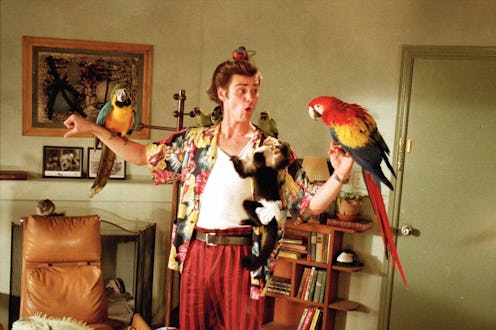Entertainment
The Difficulty Of Remaking A '90s Movie

We’ve got remakes, reboots, and retreads of Point Break, Independence Day, Jumanji, Power Rangers, Bad Boys, Beauty and the Beast, Ghost in the Shell, and the conglomerate Nicktoons empire on the way; what’s left from the ’90s bucket? Well, Morgan Creek Productions’ veritable yard sale of feature properties leaves more than 30 films from the decade up for grabs — a fact that didn’t take long to garner interest — with a push to send a select handful into the revival bin. Included in this lot are the Major League and Ace Ventura franchises, which, though ostensibly hot commodities, couldn’t very likely exist in the 2010s.
The candidacy of the pet detective and underdog baseball team stories for contemporary studio releases highlights what we don’t quite seem to get yet about the remake endeavor. One way to mount a new version of an old property is to build it as it initially was, keeping content and spirit constant in light of an accommodating atmosphere. Another way to tackle a remake is to dissect the original property beneath a modern lens, upturning facets that have since been antiquated. But it seems as though we cannot really do either of these things with ’90s movies.
It’s a problem unique to the decade, in fact. When you consider “how” to remake a property from, say, the ’40s — like the John Wayne movie Flying Tigers, which Morgan Creek has also optioned for revival — you land readily on the opportunity for reinvention thanks to the ripe fruits of the domestic American psychology circa World War II. The same can be said for films from the ’50s, which were torn asunder by the counterculture that spanned the two decades to follow.
In fact, the ’70s might present the only slate of cinema capable of being repurposed in original form today: a decade of art weighted down by an intense internal and cultural awareness, and committed to digging ever deeper into the facets of past and present. The resilient cynicism and narcissistic deconstruction of today’s artistic mentality is a lot like that of New Hollywood, though with the heightened handicap of more elusive “new ground.” As such, Morgan Creek's option to remake The Exorcist seems like the most viable opportunity of the bunch.
We’re certainly more a ’70s society than an ’80s, which was built on a counter to that counterculture — a refurbishing of that old blissful denial. We see this, of course, in how we take to ’80s schlock — an otherworldly dystopia whose commitment to oblivion can’t be fathomed by today’s excavators of the pop culture landscape — with the most insatiable hunger for irony.
But then we come to the ’90s. Yet too close for many to undertake with that same perspective of distance. And too pure, too genuinely, internally imbued with the infantilism that the ’50s coated over a black shell of panphobic bigotry, to be taken to task for its surface spackle.
We are not a ’90s Hollywood anymore. We are no longer capable of producing the glimmering, unironic innocence of Jim Carrey slapstick or feel good baseball pictures about trying and winning. Hell, the closest thing we’ve gotten lately is Moneyball: A movie about throwing out the age-old feel good recipe in favor of hard numbers. We can’t make films like Ace Ventura or Major League anymore, and we don’t yet know how to introduce them to our contemporary spectrum. And yet we will always trying until we strike gold. I guess that blind hope, that undiscerning optimism, is as close as we can get to a ’90s movie.
Images: Warner Bros (2); Paramount Pictures